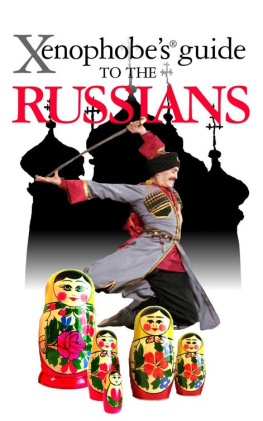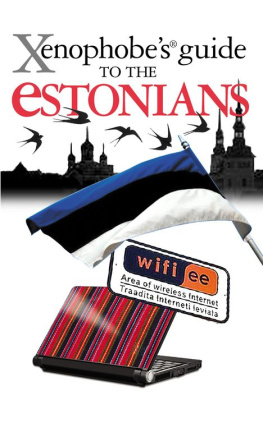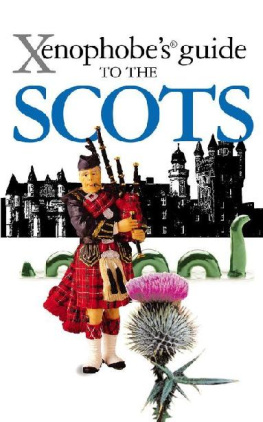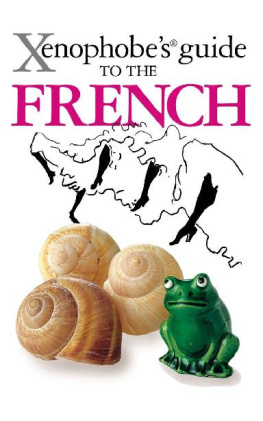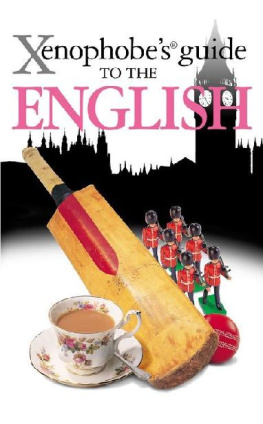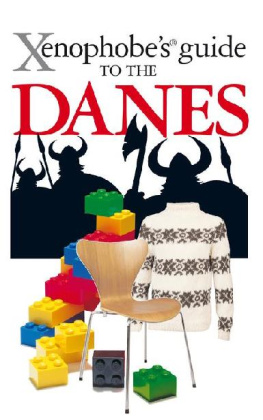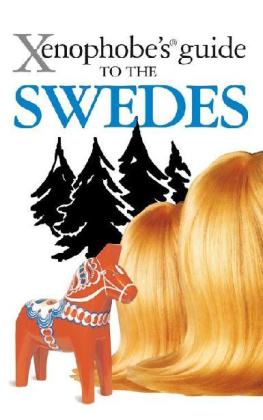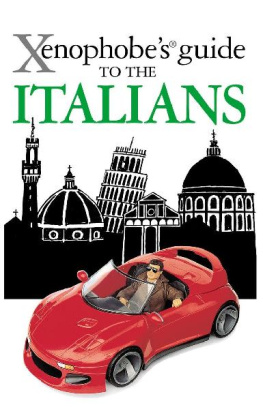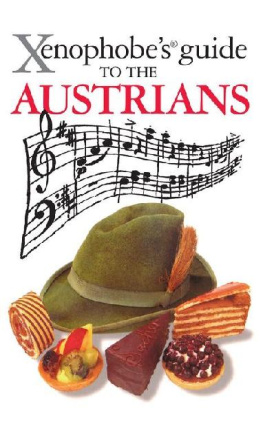Berka Petr - The Xenophobes Guide to the Czechs
Here you can read online Berka Petr - The Xenophobes Guide to the Czechs full text of the book (entire story) in english for free. Download pdf and epub, get meaning, cover and reviews about this ebook. year: 2013, publisher: Xenophobes® Guides;Oval Projects, genre: Detective and thriller. Description of the work, (preface) as well as reviews are available. Best literature library LitArk.com created for fans of good reading and offers a wide selection of genres:
Romance novel
Science fiction
Adventure
Detective
Science
History
Home and family
Prose
Art
Politics
Computer
Non-fiction
Religion
Business
Children
Humor
Choose a favorite category and find really read worthwhile books. Enjoy immersion in the world of imagination, feel the emotions of the characters or learn something new for yourself, make an fascinating discovery.
- Book:The Xenophobes Guide to the Czechs
- Author:
- Publisher:Xenophobes® Guides;Oval Projects
- Genre:
- Year:2013
- Rating:4 / 5
- Favourites:Add to favourites
- Your mark:
- 80
- 1
- 2
- 3
- 4
- 5
The Xenophobes Guide to the Czechs: summary, description and annotation
We offer to read an annotation, description, summary or preface (depends on what the author of the book "The Xenophobes Guide to the Czechs" wrote himself). If you haven't found the necessary information about the book — write in the comments, we will try to find it.
The Xenophobes Guide to the Czechs — read online for free the complete book (whole text) full work
Below is the text of the book, divided by pages. System saving the place of the last page read, allows you to conveniently read the book "The Xenophobes Guide to the Czechs" online for free, without having to search again every time where you left off. Put a bookmark, and you can go to the page where you finished reading at any time.
Font size:
Interval:
Bookmark:


The population of the Czech Republic is 10 million compared with around 5 million Slovaks, 8 million Austrians, 10 million Hungarians, 38.5 million Poles, 62 million British, 82 million Germans, 141 million Russians and 301 million Americans.
The Czech Republic is nearly twice the size of Switzerland, a third bigger than its former partner Slovakia, and a bit smaller than either Austria or Ireland. On the other hand, it could fit into Poland very nearly 4 times.
The Czechs have no one-word term to denote their homeland.
Within the territory of the Czech basin which is essentially a hilly countryside surrounded by marginally higher mountains an important feudal domain evolved. It was called the Czech Kingdom. Not long ago, Czechs lived in a joint state with the Slovaks. That state was known as Czechoslovakia. Today, a democratic system is to be found here. Its name is the Czech Republic. The Czechs, therefore, can express their homeland using either an adjective , Czech, or in compounds; the noun is simply missing.
The Czechs will forever have to be content with merely an adjective for their nation.
There is in existence the name echy (sometimes translated as Bohemia), but that refers only to the western part of the country, while the eastern part is called Moravia. Czech journalists have a tendency to use the neologism Czechia (esko), but barring nothing short of a linguistic miracle, the Czechs will forever have to be content with merely an adjective for their nation. It must simply be good enough for them to live in a Republic, which is Czech.
National pride is generally only demonstrated in sport because the one time Czechs sing their national anthem is after winning a match. People rarely react when it is played on the radio or television, they just go about their business. What is sung was not even composed as an official anthem. It was originally a 19th-century song from a comedy about a shoemakers holiday, entitled Where is my home?
The Czechs appear to believe that the Earth is the centre of the Universe, Europe is the centre of the Earth and Czechia is at the centre of Europe.
In the 16th century, Copernicus pointed out that the Sun, not the Earth, is the centre of the solar system, a fact that seems to have passed way over the heads of the Czechs. They appear to believe to this day that the Earth is at the centre of the Universe. And that, if the Earth is the centre of the Universe, Europe is the centre of the Earth and Czechia is at the centre of Europe.
The Czech Republic does in fact lie roughly at the centre of this Continent; all it takes is a look at the map, bearing in mind that the eastern borders of Europe are not formed by the suburbs of Munich but by the Urals at the borders of Siberia. It follows then, that Czechia is indeed the absolute centre of the Universe.
Hardly a year passes without some village or other claiming, on the basis of computing with the aid of a school atlas, a ruler and a cheap calculator bought for one Euro at the stationery shop, that it, and it alone, is in the exact geometrical centre of Czechia, and consequently the centre of the Universe. A small flaw in these claims is the sheer number of them: there are roughly 80, and the number is growing.
A Czech sees himself as the hero of a novel. Not the hero warrior from old Czech legends. But the good old soldier vejk.
A Czech sees himself as the hero of a novel. Not, however, a psychologically torn, post-modern hero from the novels of the Czech author Milan Kundera. Not even the hero warrior from old Czech legends. But a goodhearted, easy-going figure, rotund, talkative garrulous even who indulges in beer and pickled sausages (a local delicacy nicknamed utopence, which translates as sinkers or drowned people) from a novel by humorist and satirist Jaroslav Haek. This hero is the good old soldier vejk.
vejk, though a soldier, is essentially anti-militarist. All the same, he is drafted into the First World War and there he proves to be so idiotic and incompetent as to become a totally useless cog in the war machine. Although he is absolved from military service on an evaluation of his IQ, totally stupid he is not. In Czech pubs and in lecture theatres alike, even 80 or more years after the publication of the book, a lively discussion about whether vejk is a real idiot or successfully pretending to be one, rages on. In any case, he proves himself to be more sensible than all the blood-thirsty warmongers around him.
Virtue lies in a jolly mind, endless tall tales, a certain degree of shallowness and limitless determination not to get involved in any situation.
vejk is an inconspicuous Czech fellow. With a ready smile and silver tongue, he slips with almost proverbial luck from any scrimmage. He is a permanent outsider, but he knows how to live life to the full. He cannot be sad for long. While other national opuses trumpet the idea of love (truth, honour, etc.) being stronger than death, vejk claims that virtue also lies in a jolly mind, endless tall tales, a certain degree of shallowness and limitless determination not to get involved in any situation. vejk is not a participant in history, he is its saboteur. For his ability to sail through life the term vejking has been coined.
Every Czech is a bit like vejk. A Czech who reads Haeks The Good Soldier vejk and His Fortunes in the World War is looking in the mirror. And he looks with satisfaction, like a prima donna trying on a new necklace before the ball.
vejking carries within itself one great frustration. The inability to be a driving force of history and inseminator of ideas to redeem mankind becomes some form of general sociological retardation. In short the Czechs suffer from the classic inferiority complex of a small nation.
The Czechs rate their own character as dove-like. In history they were always the innocent invaded ones.
There are 10 million Czechs, and other similarly large (a Czech will say small) nations would refer to themselves as medium sized. If Hungarians, Portuguese or Swedes are small, what would Luxemburgers be? Or the inhabitants of San Marino? But the Czechs consider themselves to be small. They rate their own character as dove-like. In history the Czechs were always the innocent invaded ones here from the west, there from the east while all they ever wanted to do was to invent, write poetry and just be themselves. The invaders stole the drawings and plans, exploited them and from then on passed them off as their own. Thus, very few inventions managed to get smuggled all the way to the patent office by Czech chaps. For example, the Veverka cousins undoubtedly invented something called the ruchadlo an obscure improvement to the common plough. The world was supposed to sit up in awe.
This story is a part of the nations primary school curriculum and every small child knows it by heart. Its a wonder that the birthdates of the learned cousins have not yet been proclaimed a national holiday . (To be sure it would be a very popular one, for in this case it would have to be two days.)
The Czechs are extremely proud of their ruchadlo. The fact that nobody really knows exactly what a ruchadlo is, and what its good for, does not change anything one iota.
They wonder why the CNN news service does not offer a regular daily rubric: Good News from Czechia.
Font size:
Interval:
Bookmark:
Similar books «The Xenophobes Guide to the Czechs»
Look at similar books to The Xenophobes Guide to the Czechs. We have selected literature similar in name and meaning in the hope of providing readers with more options to find new, interesting, not yet read works.
Discussion, reviews of the book The Xenophobes Guide to the Czechs and just readers' own opinions. Leave your comments, write what you think about the work, its meaning or the main characters. Specify what exactly you liked and what you didn't like, and why you think so.


